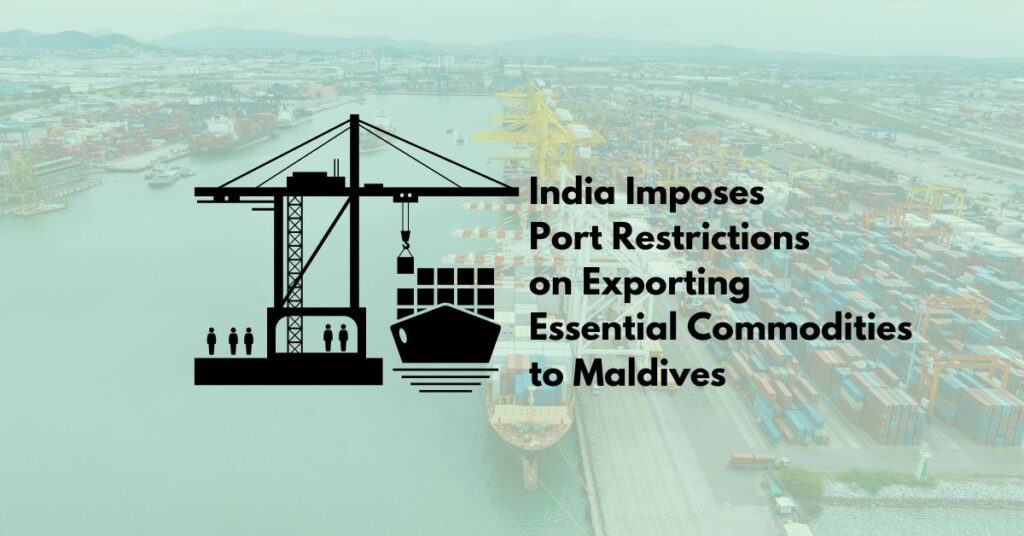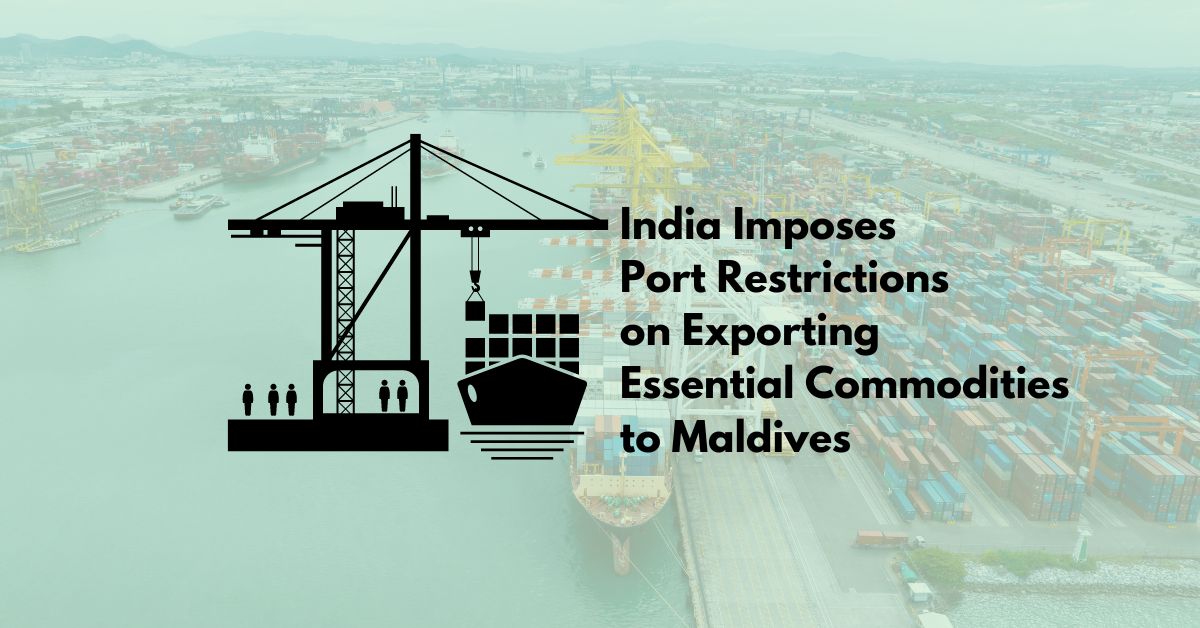India Imposes Port Restrictions on Trade with Maldives
Port Restrictions on Maldives: India’s Directorate General of Foreign Trade (DGFT) recently implemented measures impacting the export of essential commodities to the Maldives. These actions aim to regulate the export of prohibited or restricted essential items, channeling them exclusively through four designated ports in India: Mundra Sea Port in Gujarat, Tuticorin Sea Port in Tamil Nadu, Nhava Sheva Sea Port (JNPT) in Maharashtra, and ICD Tughlakabad in New Delhi.

The backdrop for these measures is a period of strained relations between India and the Maldives. Recent diplomatic challenges, including social media disputes escalating into public disagreements and travel boycotts, have intensified tensions. Additionally, Maldivian President Mohamed Muizzu’s call for the withdrawal of Indian military personnel from the Maldives has further complicated matters.
Port Restrictions on Maldives Overview:
The imposed port restrictions dictate that all shipments of essential commodities bound for the Maldives must transit exclusively through the specified customs stations. This directive limits shipping and logistics companies’ options, potentially affecting trade efficiency and costs. It is likely that these selective port requirements entail rigorous scrutiny and additional compliance measures in accordance with the Foreign Trade (Development & Regulation) Act of 1992.
- India’s Directorate General of Foreign Trade (DGFT) has introduced restrictions on the export of essential commodities to the Maldives, directing them to be exclusively routed through four designated ports.
- These designated ports include Mundra Sea Port in Gujarat, Tuticorin Sea Port in Tamil Nadu, Nhava Sheva Sea Port (JNPT) in Maharashtra, and ICD Tughlakabad in New Delhi.
- The implementation of these measures coincides with a period of strained relations between India and the Maldives, marked by diplomatic disputes and public disagreements, including social media conflicts.
- The tensions have been exacerbated by the Maldivian President’s call for the withdrawal of Indian military personnel from the Maldives, adding complexity to the bilateral relationship.
- Port restrictions entail that essential commodities destined for the Maldives must undergo processing exclusively through the specified customs stations, likely involving stringent checks and compliance measures.
- The restrictions could disrupt the supply chain, leading to logistical challenges, potential delays, and periodic shortages of essential goods in the Maldives.
- Given the Maldives’ heavy reliance on imports, particularly for food due to limited agricultural capacity, disruptions in the supply chain could have significant ramifications on daily life.
- Increased logistical costs resulting from limited port options may lead to higher prices for goods within the Maldives, potentially straining individuals with fixed incomes or limited financial resilience.
- Essential goods hold cultural and social significance beyond their economic value, and disruptions in their availability or affordability could trigger social unrest or diminish overall quality of life.
- The long-term implications of these restrictions extend beyond immediate trade concerns, encompassing broader diplomatic relations and economic agreements, potentially prompting shifts in trade partnerships and geopolitical dynamics in the region.
Impact on the Maldives:
- Supply Chain Disruptions: The restricted port access may lead to logistical challenges, causing delays in essential goods transportation and periodic shortages. Consequently, this could drive up prices, adversely affecting the cost of living for Maldivian residents.
- Dependency on Imports: Given the Maldives’ reliance on imports, particularly for food due to limited agricultural capacity, disruptions in the supply chain could significantly impact daily life.
- Economic Pressures: Higher logistical costs resulting from limited port options may translate into increased prices for goods within the Maldives. Importers might transfer these elevated costs to consumers, potentially straining individuals with fixed incomes or limited financial resilience.
- Sociocultural Implications: Essential goods are not merely economic commodities but are deeply intertwined with social and cultural practices. Disruptions in their availability or affordability can spark social unrest or diminish overall quality of life.
Long-term Considerations:
The implications of these restrictions extend beyond immediate trade concerns, encompassing broader diplomatic relations and economic agreements. Failure to address these issues through negotiation or diplomatic channels could prompt long-term shifts in trade partnerships. Such developments might prompt the Maldives to explore alternative international markets more assertively, potentially triggering various geopolitical ramifications.
Conclusion:
India’s port restrictions on essential commodity exports to the Maldives signal a complex interplay of diplomatic tensions and economic considerations. While addressing immediate logistical challenges, stakeholders must also navigate the broader geopolitical landscape to mitigate long-term repercussions on trade relations and regional dynamics.
Also Read: Madhya Pradesh Takes the Lead in Driving the Centre’s Green Credit Programme

